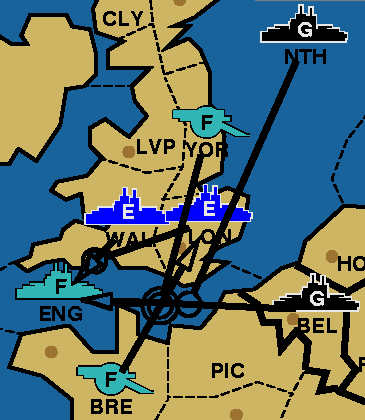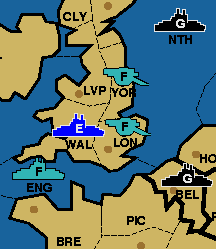

Eliminating the Paradox in Diplomacy
By Simon Szykman and Manus Hand
What's Up Here?
Back during their input into the development of the Diplomacy Player's
Technical Guide, the issue of how to adjudicate convoys came up, in
particular as it related to paradoxical situations. Both Simon Szykman and
Manus Hand had their own opinions about it. Time passed....
More recently, Manus dropped Simon a note, bringing up the topic again,
with a proposal.
Simon examined Manus' proposed rule, and replied with a rule of his
own which he had always had in mind to use should a paradoxical situation
arise in a game he was running (it never did get used, as paradoxes are
extremely uncommon situations). This rule also eliminated paradoxes,
but in a different way and therefore resulting in a different outcome.
They now present these ideas for scrutiny by and for comment from the
Diplomacy community.
Here are
the two proposed rules and the point/counter-point exchange
between Simon and Manus. Consider the following situation (a
slight modification on the traditional Pandin's paradox):

| Unit
| Order
|
|---|
English Fleet Wales
English Fleet London
| F Wal - ENG
F Lon S F Wal - ENG
French Army Brest
French Fleet English Channel
French Army Yorkshire
| A Bre - ENG - Lon
F ENG C A Bre - Lon
A Yor S A Bre - Lon
German Fleet Belgium
German Fleet North Sea
| F Bel - ENG
F NTH S F Bel - ENG
|
| | | |
If you adjudicate this situation according to the Diplomacy rules,
you will find that it leads to a paradox. If the convoy to London
fails, England and Germany have equally-well supported attacks on
the English Channel, therefore there is a standoff. This, in turn,
means that the Channel fleet is not dislodged, and
therefore the convoy succeeds, cutting the support ordered by London.
This causes Wal to lose support, eliminating the standoff in the Channel,
allowing the German attack on the English Channel to succeed, dislodging
the fleet there, and disrupting the convoy. This means that Brest does
not attack London, reinstating the support given by London, causing a
standoff, allowing the convoy to succeed, which cuts support... and so on
and so on.
Why does this happen? Because there
is an inconsistency in the Diplomacy rules that makes it impossible
to adjudicate this situation without a paradox. Or, put slightly
differently, there is no one single result that is consistent with the
combination of rules on convoys, support, and support-cutting.
So how to eliminate the paradox? Simple. Add a rule that forbids
paradoxes from happening. But you can't just add a rule that says
"Paradoxes are forbidden" because such a rule would not tell you how
the above (currently paradoxical) situation should be adjudicated.
You need to come up with a rule that allows players to determine
a single outcome for that situation.
Okay. Before we actually talk about specific paradox-eliminating rules,
let's assume for a moment that we live in a world where such a rule
exists. Okay? There is no paradox. Say it out loud.
"There is no paradox." Good. The question is, since we have (in this
imaginary world) a set of
Diplomacy rules that does not result in a paradox for the above orders,
what does the board look like after they are adjudicated?
Here are two possibilities:
| Resolution 1
|
| Resolution 2
|
|
|
|
|---|
English Fleet Wales
English Fleet Wales
English Fleet London
French Army London
French Fleet English Channel
French Army Yorkshire
French Army Brest
French Fleet English Channel
French Army Yorkshire
German Fleet Belgium
German Fleet North Sea
German Fleet Belgium
German Fleet North Sea
Summary: The French convoy succeeds, dislodging
and destroying the English fleet in London.
| Summary: No change in position
| | | | | | |
Before discussing any actual rules, Simon and Manus
want to get a gut reaction to the situation from readers. So please
click on one of the buttons below to proceed to the rules and discussion.
Note that you may not be 100% satisfied with either outcome, because
this situation is one in which there fundamentally is no possible outcome
that is completely consistent with all the Diplomacy rules. So we are
not asking for absolute satisfaction... just which seems more right (or
less wrong). If you absolutely just cannot make up your mind, you can
click the third button. Regardless of how you answer now, you will be
asked again after the discussion and will have the opportunity to change
your mind.

|
Manus Hand
(manus@manushand.com)
|

|
Simon Szykman
(simon@diplom.org)
|
If you wish to e-mail feedback on this article to the authors, and clicking
on an envelope above does not work for you, feel free to use the
"Dear DP..." mail interface.







